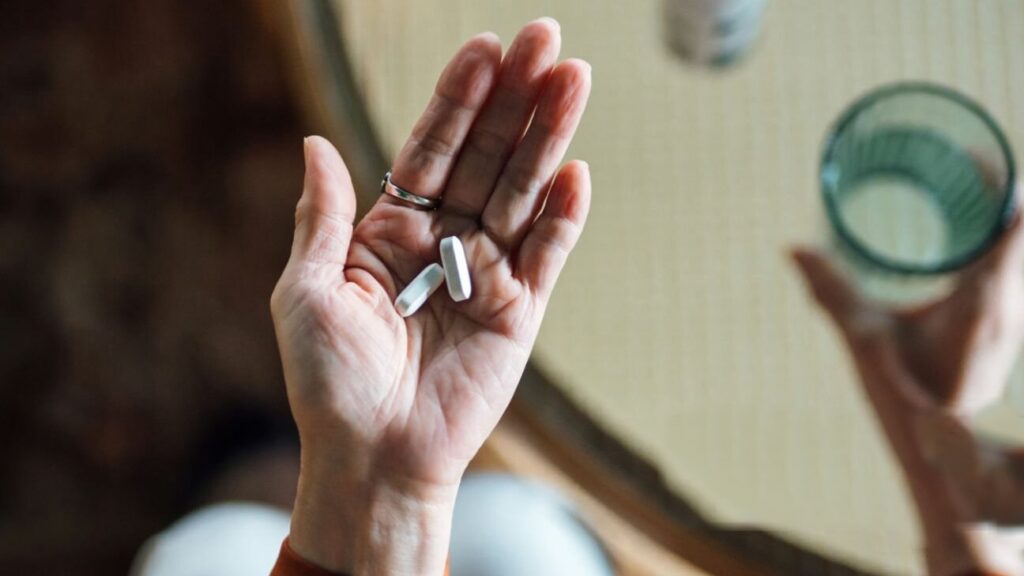Evidence Based
This article relies on solid scientific evidence, authored by experts, and thoroughly fact-checked by specialists.
Our team of licensed nutritionists and dietitians strives to maintain objectivity, impartiality, and honesty. We aim to present a fair representation of both sides of the argument.
Scientific references are included throughout this article. The numbers in parentheses (1, 2, 3) are clickable links to peer-reviewed scientific papers. These sources further support the information provided.

Depression is a complex and challenging condition that affects millions of people worldwide. While seeking professional help is crucial, there are natural remedies that can complement traditional treatments and support emotional well-being. In this article, we explore six remarkable herbs and supplements that have shown promise in alleviating depression symptoms. Incorporating these natural remedies into your routine may provide an additional layer of support on your path to healing.
6 Herbs and Suplements
- St. John’s Wort, the Sunshine Herb: St. John’s Wort, a bright yellow flowering plant, has been used for centuries to treat depression. Its active compounds have been found to increase the levels of serotonin, dopamine, and norepinephrine in the brain, which are essential neurotransmitters for mood regulation. Several studies suggest that St. John’s Wort may be as effective as certain antidepressant medications, making it a valuable natural alternative.
- Saffron, the Golden Spice of Serenity: Saffron, known for its vibrant color and distinct flavor, is not only a culinary delight but also a potent antidepressant herb. This precious spice contains safranal and crocin, which have demonstrated antidepressant effects in various studies. Saffron (1
PubMed Central
Highly respected database from the National Institutes of Health
Go to source ) may help improve mood, reduce anxiety, and increase emotional balance. Incorporating saffron into your diet or using it as a supplement may have a positive impact on your mental well-being. - Omega-3 Fatty Acids, the Brain’s Best Friend: Omega-3 fatty acids, commonly found in fatty fish like salmon, mackerel, and sardines, have long been recognized for their role in promoting heart health. However, recent research suggests that these essential fats can also play a significant role in combating depression. Omega-3s help reduce inflammation in the brain and support the production of neurotransmitters that regulate mood. If you’re not a fan of seafood, you can explore high-quality fish oil supplements as an alternative.
- Ashwagandha, the Ancient Stress Buster: Ashwagandha, an adaptogenic herb used in Ayurvedic medicine, has gained popularity for its ability to combat stress and anxiety. Chronic stress often contributes to the development of depression, and ashwagandha may help alleviate its symptoms. This herb works by reducing cortisol, the stress hormone, and promoting a sense of calm and relaxation. Adding ashwagandha to your wellness routine may assist in managing stress and enhancing your overall mood.
- Rhodiola Rosea, the Energizing Herb: Rhodiola Rosea, also known as “golden root,” is an adaptogenic herb that has been used for centuries to combat fatigue and enhance mental performance. Studies suggest that Rhodiola Rosea can improve symptoms of depression by boosting serotonin and dopamine levels while reducing stress hormone levels. This herbal supplement may provide a natural energy boost, increase focus, and uplift your mood.
- Vitamin D, the Sunshine Vitamin: Vitamin D, often referred to as the “sunshine vitamin,” plays a crucial role in our mental health. Sunlight exposure triggers the production of vitamin D in our bodies, and low levels of this vitamin have been associated with an increased risk of depression. If you live in an area with limited sunlight or spend most of your time indoors, consider taking a vitamin D supplement to ensure adequate levels. However, it’s essential to consult with a healthcare professional to determine the appropriate dosage for your specific needs.
Herbs Are Not Yet Proven to Ease Depression
While there are herbs and supplements that show promising potential in alleviating depression symptoms, it’s important to note that not all herbs have been extensively studied or proven effective for treating depression. Here are a few herbs that have not yet been scientifically validated for their efficacy in easing depression:
- Valerian Root: Valerian root is commonly used as a sleep aid and to reduce anxiety. While it may help with certain symptoms associated with depression, such as insomnia or restlessness, there is limited scientific evidence to support its effectiveness as a stand-alone treatment for depression.
- Passionflower: Passionflower is often used as a natural remedy for anxiety and insomnia. It has calming properties and may induce relaxation. However, there is insufficient scientific evidence to confirm its direct impact on depression symptoms.
- Kava: Kava is a plant native to the South Pacific that is known for its anxiolytic (anxiety-reducing) effects. While it may help with symptoms of anxiety, its effectiveness in treating depression is yet to be established through rigorous scientific research.
- Ginkgo Biloba: Ginkgo biloba is commonly used to improve cognitive function and enhance memory. While it may have some positive effects on mood, there is limited evidence to support its direct effectiveness in treating depression.
- Chamomile: Chamomile is widely known for its calming properties and is often used to promote relaxation and reduce anxiety. While it can be beneficial for managing stress and supporting overall well-being, its specific impact on depression symptoms remains unclear.
It’s important to approach these herbs with caution and not solely rely on them as a primary treatment for depression. If you are considering incorporating any herbs or supplements into your depression management plan, it’s crucial to consult with a healthcare professional to ensure they are safe and compatible with any existing medications or treatments you may be undergoing. Remember, evidence-based treatments and professional guidance should always be prioritized when addressing the complex nature of depression.
Talk to Your Doctor
Before incorporating any new herbs or supplements into your depression management plan, it is essential to have an open and honest conversation with your healthcare provider. Here are a few reasons why consulting your doctor is crucial:
- Professional Guidance: Your healthcare provider has a comprehensive understanding of your medical history, current medications, and any pre-existing conditions. They can assess the potential interactions, side effects, and suitability of herbs or supplements for your specific situation. They can offer personalized advice that takes into account your unique needs.
- Safety Considerations: While herbs and supplements are generally considered natural, they can still have potent effects on the body. It’s important to ensure that the herbs or supplements you are considering are safe and won’t interfere with any prescribed medications or treatments you are currently undergoing. Your doctor can provide insights on potential risks and help you make an informed decision.
- Monitoring and Dosage: Your healthcare provider can guide you on the appropriate dosage and frequency of herbs or supplements. They can also monitor your progress and make adjustments as necessary. Regular check-ins with your doctor can help ensure that you are receiving the optimal benefits and avoiding any potential complications.
- Comprehensive Treatment Approach: Depression is a complex condition that often requires a multifaceted approach to management. Your doctor can help you develop a comprehensive treatment plan that includes evidence-based therapies, lifestyle modifications, and, if appropriate, the incorporation of herbs or supplements. They can provide guidance on how to integrate these natural remedies into your existing treatment regimen.
- Holistic Assessment: Depression can have various underlying causes and contributing factors. Your doctor can perform a thorough assessment to identify any potential underlying conditions that may require specific interventions. They can help you address the root causes of your depression rather than solely focusing on symptom management.
Remember, your doctor is your trusted partner in managing your mental health. Their expertise and guidance are invaluable in navigating the complexities of depression and ensuring that you receive the most appropriate and effective care. Open communication and collaboration with your healthcare provider will help you make informed decisions and embark on a path toward improved well-being.




